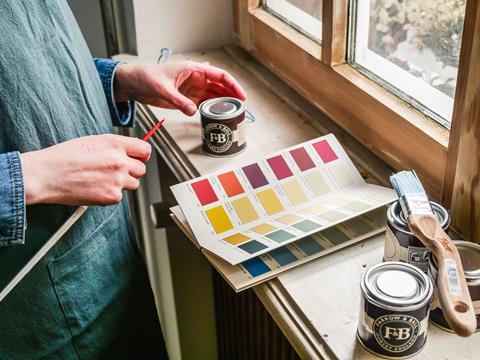You know the housing market’s on the up when queues form outside posh paint purveyor Farrow & Ball.

The market has emerged from lockdown more convincingly than almost any pundit envisaged.
But will it last? Possibly, but only if the economy and government don’t screw up. So not much of an ask.
For now at least, buyer demand, transaction levels and house prices have recovered strongly and, tellingly, across all of England and Wales, since estate agents re-opened in May. I’m told it’s getting very hard to find a valuer and my local Farrow & Ball appears to be doing a roaring trade in tins of Ammonite and Cooking Apple Green – no doubt as owners tart up their homes in a dash to trade up.
Statistical evidence of a market recovery is pretty comprehensive. Estate agents saw the largest monthly increase for over 20 years in buyer enquiries in July, according to the latest RICS Residential Market Survey. The net balance (surveyors reporting a rise minus those seeing a fall) between June and July hit +75%. Every region showed rises over the prevailing averages, with London’s relatively muted figure possibly reflecting what had already been a strong market after the December election.

Halifax reported a 5.2% annualised increase in prices during August – the highest since 2016 – to an all-time high of £245,000.
Although a more lagging indicator, HMRC reported that completed deals in England rose to 61,390 in June from the 11-year low of 32,310 in April, immediately after lockdown, lower year-on-year but better than the -56% in April. Sales also seem to be progressing faster, despite a dearth of valuers and increasingly pernickety lenders. That’s despite the spectre of looming mass unemployment and, before long, higher taxes. Oh, and fears of a second wave of the virus. Halifax alluded to these themes in an unusually cautionary statement. (But I suspect this might be the UK largest mortgage lender justifying its recent toughening in lending criteria.)
However, for now, there’s not just the much-touted pent-up demand driving the rebound and the stamp duty effect. The other somewhat more uncomfortable truth is that many people in jobs have never had it so good. They are getting paid the same with no commuting costs and a fraction of their discretionary expenditure. No Pret lunches and flat whites. No after-work drinks, fewer haircuts and no dry cleaning of suits (with a ‘Zoom shirt’, one side ironed, lasting at least a week).
Boost to productivity
With refunds from cancelled foreign holidays, many office workers are managing to save up towards deposits. Many home workers are also persuading themselves that their new working habits are far more efficient. There’s no travelling and the dearth of internal management meetings is probably the greatest boost to productivity in the history of offices.
The one constraint many are feeling is the distances between their four walls. Surveys by Nationwide, RICS and others support widespread hearsay that many homeowners plan to move further from their city locations to bigger homes, with gardens, in preparation for possible future lockdowns. Offices, for many, will become occasional hubs to drum up new business face to face, rather than nine-to-five destinations.
I’m less convinced by the potential impact of the end of furloughing. Tragic as rising unemployment may be, those hit are less likely to be on or near joining the housing ladder. But it would hit the sales market if there was an entrenched slump in consumer spending among those still in jobs.
A major threat is the planned ending of the stamp duty holiday. Chancellor Rishi Sunak looks like he hadn’t been born in 1988 when his predecessor Nigel Lawson triggered the biggest housing crash since the 1970s by giving couples six months to use their double mortgage interest tax relief (‘Miras’) before pulling it as planned. Prices shot up, especially in London, then tanked the day after the deadline – leaving the market moribund for the best part of the next decade.
If the current boom doesn’t dry up quicker that a five-litre tin of Parma Gray, Sunak needs to consider a tapering, rather than cliff-edge ending to the stamp duty holiday.
Alastair Stewart is an equities analyst and consultant






























No comments yet